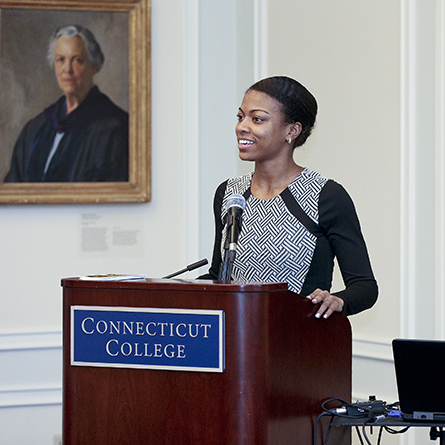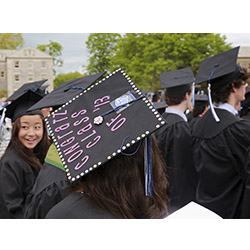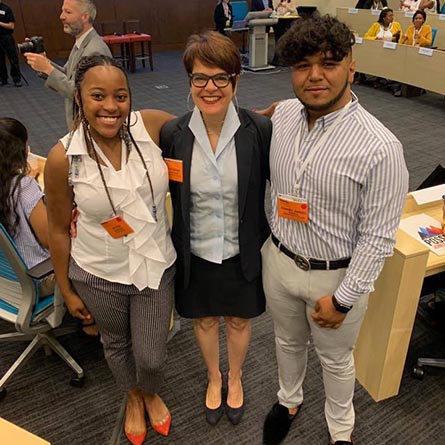
Howard Gordon tells Class of 2013: ‘Work hard and be nice’

See a slideshow of photos from Commencement.
In a keynote speech punctuated with cartoon references and the occasional appearance by a 19th century poet, Emmy-winning television writer and producer Howard Gordon told the often hilarious tale of his own success and left the 443 members of the Class of 2013 with advice as profound as it is simple: Work hard and be nice.
Gordon, co-creator of the television series "Homeland," for which he won the 2012 Primetime Emmy Award for Outstanding Writing for a Drama Series, addressed the large crowd gathered on Tempel Green for Connecticut College's 95th Commencement on May 19. He described television as “a kind of massive campfire” to prompt millions of people to think about society’s great challenges and start difficult conversations.
“The fictional characters I create live in the same crazy, complicated world as the rest of us,” he said. “How they navigate through the world is what makes them compelling. How you navigate your way through the world is what will make your story compelling.”
The best way to do it, he told the Class of 2013, is to heed the sage words of advice printed on the poster in his office: “Work hard and be nice to people.”
“I apologize for what may sound like fortune-cookie philosophy, but this seven-word sentence inspires me every day,” he said.
Working hard will not guarantee success, he told the graduates, “But I have yet to meet a successful person who hasn’t worked hard.” Being nice, he added, is in many ways about listening to others. “Listening takes practice, and it takes patience. But I promise, if you listen, your story will be better for it.”
Prior to giving his speech, Gordon was presented with an honorary doctorate of humane letters by Connecticut College President Leo I. Higdon Jr.
During his remarks, Higdon said the Class of 2013 has met the challenges he outlined for them when they arrived during a torrential downpour in the late summer of 2009.
"You have become leaders on this campus – relied upon by students, faculty and staff for your opinions, your expertise and your involvement,” he told the graduates.
Higdon added that the Class of 2013 had the honor of attending Connecticut College during an important time in its history. The Class celebrated the College’s Centennial; witnessed the ribbon cuttings for the new fitness center and the new science center; was the first to benefit from the Residential Education Fellows program, in which professors and students work together to enhance intellectual programming in the residence halls; and is the first to include Posse Foundation scholars, a group of student leaders who have helped the College become a more welcoming community for people from all backgrounds.
As Higdon reflected on his upcoming retirement in December, he said he was incredibly proud of the Class of 2013 and humbled by the thought of all they would become.
“You have your entire future ahead of you. I hope you continue to embrace learning in all forms; continue to cross boundaries and to make connections others don’t see; and continue to live the values of the Honor Code and to respect and value equity and inclusiveness as part of your life-long learning. Above all, please stay connected to Connecticut College,” he said.
Senior class speaker Amy Evelyn Cheetham, of Monroe, Maine, shared her own hopes for the future, urging her classmates to never stop exploring and following their passions.
“Our most powerful tool is our liberal arts education,” said Cheetham, the daughter of 1974 and 1975 graduates Thomas and Joan Cheetham. “We’ve been taught to think critically about the very foundations of modern society: to question our actions and our ideas, and the thoughts and deeds of those who came before us. When we leave here today, our most immediate challenges may be renting that first apartment and getting that first job. But our biggest challenge is one we’ll face for the rest of our lives: to use our educations to chase our passions and cling to them for dear life.”
Also during the ceremony, the Oakes and Louise Ames Prize was awarded to Douglas Gregory Bernstein, a religious studies major from Bethesda, Md. for his honors thesis, "Tearing the Yellow Hat in Two: Conflict and Controversy in the Evolution of Gelugpa Buddhist Authority in Tibet." In the work, Bernstein incisively analyzes two internal controversies within the Gelugpa (or Yellow Hat) school of Tibetan Buddhism and explores the implications of these for contemporary Tibetan Buddhists in Tibet and in exile. The prize, named for a previous president of the college and his wife, is given to a graduating senior who has completed this year's most outstanding honors study.
The equally prestigious Anna Lord Strauss Medal was awarded to Marline Sharron Johnson, a psychology major and art minor from Chicago, Ill., for outstanding community service and commitment to justice and equity. A Posse Foundation scholar, Johnson is among the eight students who make up the first graduating class of Posse students at Connecticut College. Johnson’s commitment to civic and social justice upholds the ideals of Anna Lord Strauss, who served as national president of the League of Women Voters and as a Connecticut College trustee for the extraordinary term of 32 years.
The Connecticut College Medal - the highest honor that can be conferred on an individual - was awarded to former trustee Linda J. Lear, a 1962 Connecticut College graduate, and emeritus trustee Raymond J. Debbane, a parent of 2009 and 2013 Connecticut College graduates, for demonstrated distinction in their fields and in their leadership at Connecticut College.
Lear’s powerful advocacy for the natural world and remarkable ability to give voice to important women who cherished it deeply have brought great honor and distinction to Connecticut College. A successful scholar, teacher and author, Lear wrote the definitive biography of environmental activist Rachel Carson. Her extraordinary commitment to scholarship is demonstrated in her leadership of the Committee on Academics during her tenure as a trustee. At Connecticut College, she generously established the Linda Lear Center for Special Collections and Archives, which provides unique opportunities for student research. She has also supported scholarships for students and the Goodwin-Niering Center for the Environment, which recognized her in 1999 with its Alumni Environmental Achievement Award.
Debbane was honored for his commitment to social and economic justice. He devotes considerable time to issues of global justice, including malnutrition and hunger, and is the chair of the board of Action Against Hunger/ ACF-USA. At Connecticut College, he is a supporter of innovative programs that encourage students to explore other cultures, embrace new perspectives and develop a better understanding of cultural and social differences.
Commencement activities began Saturday with Baccalaureate, an annual celebration of the spiritual diversity of the graduating class. Ronald Flores, associate professor of sociology, gave the keynote address, “Civic Vision: Seeing the Invisible on the Path to a Just Society.”
Meet the Class of 2013
Degrees Awarded
- Bachelor of arts: 443
- Master of arts: 2
Fields of Study
- Most popular majors: economics, psychology, biology, government, international relations
- Double majors: 94
- Most popular combination of majors: economics and international relations
- Triple majors: 1 (dance, sociology and French)
- Most unusual major: post-colonial linguistic anthropology (one of six student-designed majors)
Signature Experiences
- Studied abroad: 182
- Performed community service: 67 percent
- Completed a College-funded internship or summer research:77 percent
- Earned a certificate from an academic center: 67
- Ammerman Center for Arts & Technology: 5
- Goodwin-Niering Center for the Environment: 10
- Holleran Center for Community Action and Public Policy: 23
- Toor Cummings Center for International Studies and the Liberal Arts: 29
- Earned a certificate in museum studies: 7
- Earned teaching certification: 13
Honors
- Inducted into Phi Beta Kappa:43
- Latin honors: 141
- Departmental honors: 186
- Three Fulbright Fellowship winners, a Davis Projects for Peace winner and eight All-American athletes
Where They Came From
29 states in the U.S. and 19 other countries or territories (Angola, Bosnia and Herzegovina, Bulgaria, Cambodia, Cameroon, Canada, China, Croatia, Georgia, Kenya, Nepal, Norway, Pakistan, Sierra Leone, Singapore, Tanzania, Tunisia, United Kingdom and Vietnam)
Where They’re Going Next
As they packed up their dorm rooms, the Class of 2013 was heading in many different directions, from first jobs to grad schools to service organizations, such as Americorps and Teach for America. Some members of the class were still job hunting or reviewing their options; a few had plans to travel before joining the workforce.
Many employers of the Class of 2013 are large and well known; major hospitals, accounting firms and financial services companies are represented. Others are small and specialized, including a German travel agency, a dance company and an organic farm. The most common titles for these first post-college jobs are business analyst, teacher, research assistant and paralegal.
The graduates planning to continue their studies immediately are enrolling at a wide range of graduate and professional programs at public and private universities across the United States. Many graduates are pursuing master’s degrees in fields as varied as public health, economics, fine arts, nuclear engineering and forensic psychology. Others are going to doctoral programs or schools of law, medicine, dentistry and veterinary medicine. A few of the new graduates will be leaving the U.S. to study, including at the London School of Economics, the University of Ottawa, the University of Oxford, Paris College of Art and the Norwegian University of Science and Technology.
May 19, 2013
